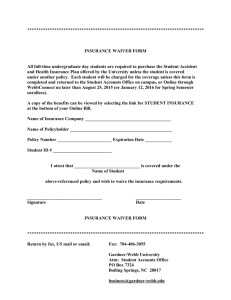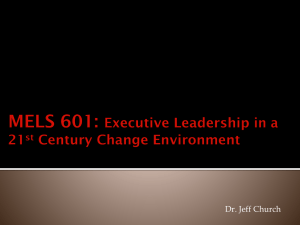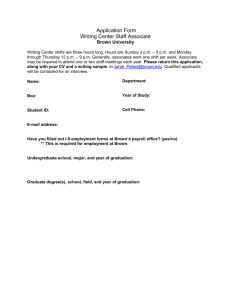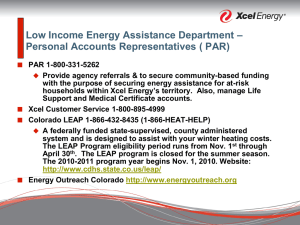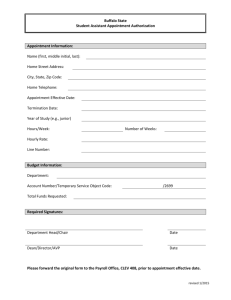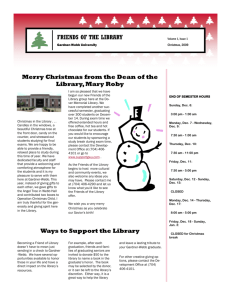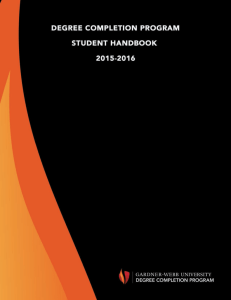File
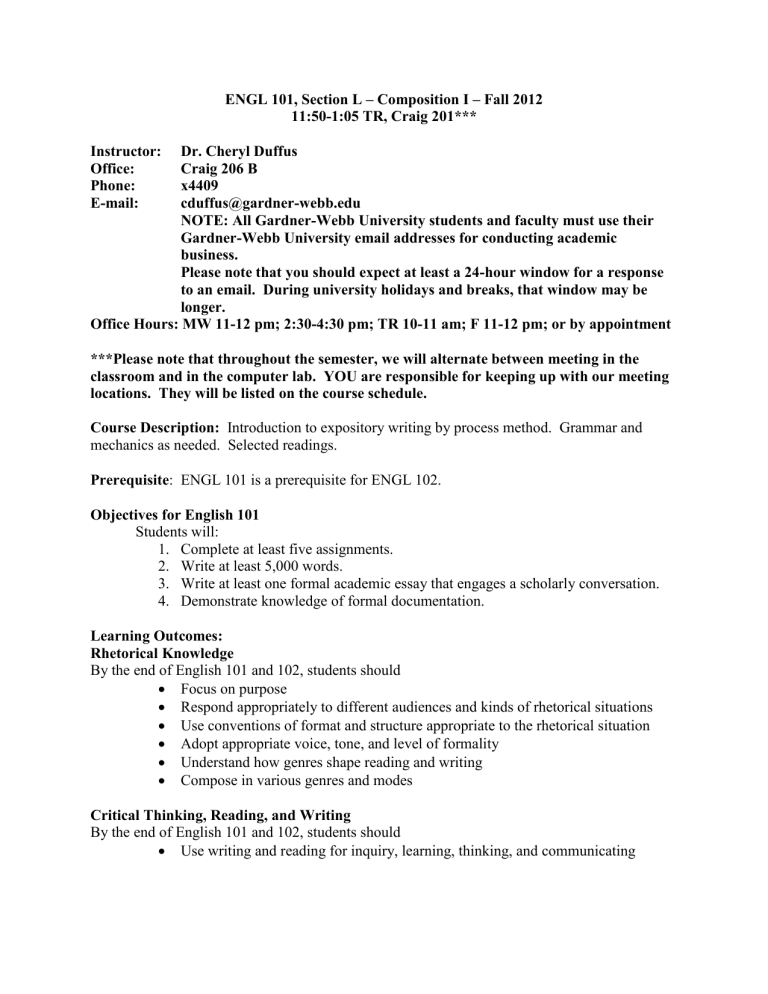
ENGL 101, Section L – Composition I – Fall 2012
11:50-1:05 TR, Craig 201***
Instructor: Dr. Cheryl Duffus
Office: Craig 206 B
Phone:
E-mail: x4409 cduffus@gardner-webb.edu
NOTE: All Gardner-Webb University students and faculty must use their
Gardner-Webb University email addresses for conducting academic business.
Please note that you should expect at least a 24-hour window for a response to an email. During university holidays and breaks, that window may be longer.
Office Hours: MW 11-12 pm; 2:30-4:30 pm; TR 10-11 am; F 11-12 pm; or by appointment
***Please note that throughout the semester, we will alternate between meeting in the classroom and in the computer lab. YOU are responsible for keeping up with our meeting locations. They will be listed on the course schedule.
Course Description: Introduction to expository writing by process method. Grammar and mechanics as needed. Selected readings.
Prerequisite : ENGL 101 is a prerequisite for ENGL 102.
Objectives for English 101
Students will:
1.
Complete at least five assignments.
2.
Write at least 5,000 words.
3.
Write at least one formal academic essay that engages a scholarly conversation.
4.
Demonstrate knowledge of formal documentation.
Learning Outcomes:
Rhetorical Knowledge
By the end of English 101 and 102, students should
Focus on purpose
Respond appropriately to different audiences and kinds of rhetorical situations
Use conventions of format and structure appropriate to the rhetorical situation
Adopt appropriate voice, tone, and level of formality
Understand how genres shape reading and writing
Compose in various genres and modes
Critical Thinking, Reading, and Writing
By the end of English 101 and 102, students should
Use writing and reading for inquiry, learning, thinking, and communicating
Understand a writing assignment as a series of tasks, including finding, evaluating, analyzing, and synthesizing appropriate primary and secondary sources
Integrate their own ideas with those of others
Understand the relationship among language, knowledge, and power
Processes
By the end of English 101 and 102, students should
Be aware that it usually takes multiple drafts to create and complete a successful text
Develop flexible strategies for generating, revising, editing, and proof-reading
Understand writing as an open process that permits writers to use later invention and re-thinking to revise their work
Understand the collaborative and social aspects of writing processes
Learn to critique their own and others’ works
Learn to balance the advantages of relying on others with the responsibility of doing their part
Use a variety of technologies to address a range of audiences
Knowledge of Conventions
By the end of English 101 and 102, students should
Learn common formats for different kinds of texts
Develop knowledge of genre conventions ranging from structure and paragraphing to tone and mechanics
Practice appropriate means of documentation
Control such surface features as syntax, grammar, punctuation, and spelling
Information Literacy
English 101 and 102 promote information literacy using the standards articulated in Information
Literacy Standards for Higher Education :
1.
“The information-literate student defines and articulates the need for information.”
2.
“The information-literate student accesses needed information effectively and efficiently.”
3.
“The information-literate student evaluates information and its sources critically and incorporates selected information into his or her knowledge base and value system.”
4.
“The information-literate student, individually or as a member of a group, uses information effectively to accomplish a specific purpose.”
5.
“The information-literate student understands many of the economic, legal, and social issues surrounding the use of information and accesses and uses information ethically and legally.”
General Education Competencies for Division of Humanities
A.
Students will develop skills in formulating well organized thoughts for the purpose of effective communication.
B.
Students will demonstrate the ability to analyze written, oral, or visual forms of communication and create appropriate responses.
C.
Students will compare and contrast intra- and intercultural realities to cultivate attributes necessary for adapting to and functioning in a globalized world.
D.
Students will develop skills in effective research using traditional and technology-based research methods.
Texts and supplies:
1) Required textbook : Kirszner and Mandell.; The Pocket Wadsworth Handbook , 5 th
ed. with 2009 MLA update. Other readings will be supplied by the instructor, either electronically or as photocopies.
2) You will also need a back-up method or device for bringing files to class and reliable access to a computer and the Internet.
3) Finally, you will need a daybook that you should bring to class every day.
Department Grading Scale
In order to insure grading consistency the English Department established the following grading scale for all English courses:
2.00
1.67
1.33
1.0
0.67
0
GPA
4.0
4.0
3.67
3.33
3.00
2.67
2.33
C
C-
D+
D
D-
F
Letter Grade
A+
A
A-
B+
B
B-
C+
Numeric Grade
99-100
96-98
94-95
92-93
88-91
86-87
84-85
80-83
78-79
76-77
72-75
70-71
69>
Emergency Plans: In case of an on-campus emergency that requires evacuation of the building, please assemble as quickly as possible at the following location to check in with your professor: the turn-around traffic island behind Craig.
Assignments as public documents : All work in this class will be public. In other words, other people may be allowed to read it, but any work shared will not have the student’s name on it.
Manuscript requirements
Students should familiarize themselves with Turnitin.com. It is the English department’s policy to use this service as one tool for encouraging academic integrity. Therefore, unless otherwise indicated, all papers or work done outside the classroom and submitted to the professor must also be electronically submitted to Turnitin.com. This will happen through Blackboard.
If you are having problems with Internet access in one location, such as your dorm room, you will need to go to another location such as the Library or a Computer Lab to upload your
documents to Turnitin.com. Unless there is a long-term, campus-wide Internet shut-down or a
Turnitin.com website problem, computer / Internet issues are not an excuse for late work.
Absence policy
You are expected to attend every class meeting. University policy mandates that attending fewer than 75% of class meetings will result in automatic failure. This cut-off includes absences due to
University activities such as athletics or class trips as well as absences due to personal illness or family situations. You are responsible for keeping track of your absences.
Late work
Every late assignment will be docked 10% for every class meeting day it is late. If you have a serious illness or emergency, you will not receive a late penalty. However, no late work will be accepted more than one week after the due date, unless you are dealing with a traumatic emergency situation such as personal hospitalization or the death of an immediate family member.
Academic Dishonesty
Using someone else's words or ideas without giving credit with documentation and quotation marks when appropriate is plagiarism. “Someone else” includes work by people you know, material posted or sold on-line, and material printed in books or periodicals. You need to cite any information you take from textbooks, either in the footnotes or in the introductory essays.
Information you look up on line also needs to be cited, even if it seems like “common knowledge” (if you had to look it up, it’s not common knowledge to you). If you use information from another class, please acknowledge your sources.
It is the English Department’s policy that a grade of
F for the course will be assigned any time a student submits any draft of a major assignment of which a substantial portion has been falsely represented as the student’s own.
Minor assignments that are plagiarized will also be prosecuted according to University Academic Dishonesty Policy. This policy includes both final drafts and rough drafts submitted either to the instructor, to the writing center, or to a peer.
Resubmitting work you have done for another class without receiving prior permission from your professor will be considered academic dishonesty and will receive the same penalty.
The Final Exam
The final exam will be on Tuesday, December 11, 2012, 11:00 am . The final exam schedule is set in stone and cannot be changed unless you have a truly serious (and, generally, unexpected) emergency such as a death in the family, a serious illness requiring hospitalization, or an obligation to be away on University business (e.g., you are an athlete and have a scheduled game). DO NOT make personal travel plans before or during the final exam date and time.
Personal travel plans are not a sufficient excuse for rescheduling the final exam unless you are traveling for some sort of emergency or University event.
Noel Program
If your learning or participation in this class might be affected in any way by a disability recognized under the Americans with Disabilities Act (ADA), you will need to do the following:
(1) register with the Noel Program for the Disabled at Gardner-Webb University--(704)
406-4270; and (2) educate me about your disability so that I can work with you and the Noel
Program to arrange necessary accommodations. It is important that you take both of these steps no later than the first week of the semester.
Class Cancellation Notice: In the event that class must be cancelled, I will attempt to give you as much notice as possible. I will notify you over email, if possible, I will post an announcement on Blackboard, and our department administrative assistant will ALWAYS leave a note on the classroom door if class is cancelled. Please note that if class is cancelled due to instructor illness or emergency, you might have less than 24 hour notice.
Participation and Classroom Behavior: All students are expected to participate in class discussion. All members of the class are expected to be courteous and respectful to fellow class members as well as the professor and any visitors to the classroom. A classroom is a welcoming and supportive place for all students, faculty, and staff, and it is important to respect and to appreciate the differences among us, including race, gender, ethnicity, sexual orientation, disability, religion, or political affiliation. If anyone feels they have been discriminated against in this classroom or on campus, please speak with me in my office.
In addition, the “Classroom Conduct Policy” from the Student Handbook states the following:
“Students are expected to conduct themselves in a manner which does not distract from or disrupt the educational pursuits of others.” Disrespectful, distracting, or disruptive behavior will be mediated first by the professor who will attempt to resolve the conflict. If a resolution cannot be found, then the Vice President and Dean of Student Development will be asked to intervene.
Electronic devices: It is important to remember that we all need to self-regulate our use of cell phones in a classroom. Obviously, calls cannot be made during class unless there is an emergency requiring us to contact 911. Texting, however, falls into a different category.
Students who constantly text during class send the message to this professor and their peers that they are not engaged or do not consider class to be important. Students may not use cell phones for any reason during an exam. Laptop or tablet use is permitted only on designated days
Food and Drinks: Do not bring any type of food to class, including snacks from vending machines. Beverages are permitted.
Assistance Outside the Classroom
I am available to meet with any student as frequently as s/he would like. You do not need to make an appointment to see me during my office hours, but if you cannot meet during those times, please let me know, and we can set up a time and day convenient for both of us. I am also happy to communicate over e-mail and the phone, although questions about writing are more easily answered either in person or over e-mail. Your fellow classmates are also valuable resources for out-of-class discussion. Please contact me ASAP if you are feeling lost or overwhelmed this semester, either in general or in this class, so that we can work out a solution together.
GWU Writing Center, Tucker Student Center Rm 237
The Writing Center is a resource for all students, regardless of major or level of study. Writing
Center consultants are fellow students who have a solid grasp of the English language and writing who also enjoy assisting others. They will help you with developing and revising your ideas as well as polishing your final draft. You can make an appointment for a consultation in
Webb Connect or walk in to see if there's an available appointment. Visit gardnerwebb.edu/writingcenter for important information like semester hours of operation.
Learning Enrichment and Assistance Program
The Learning Enrichment and Assistance Program (LEAP) provides peer tutoring for Gardner-
Webb students. Peer tutors will work with students to refine study skills and clarify course content. Our tutoring is offered on campus in the Tucker Student Center, room 336, next to the Student Success Center . While we try to meet the needs of our students, we do not have resources available to offer tutoring in every course/subject. Should tutoring for certain course/subjects not be available, the student may contact the LEAP program to determine if other campus resources are available. Students can make an appointment with a peer tutor in
WebbConnect by clicking on “Academic Support” and “Peer Tutoring Appointment Scheduler.”
Prior to requesting a tutor, LEAP recommends that an interested student speak first with his/her professor about concerns in a particular class; professors can provide insight into which areas need attention or which strategies might be helpful in specific courses. Please contact LEAP by emailing leap@gardner-webb.edu
or visit our website at gardner-webb.edu/leap . Feel free to visit our office on the third floor of the Tucker Student Center.
